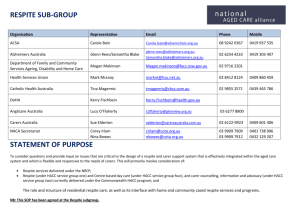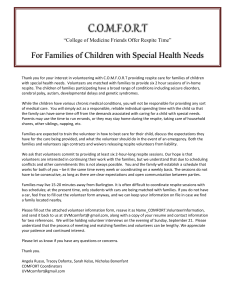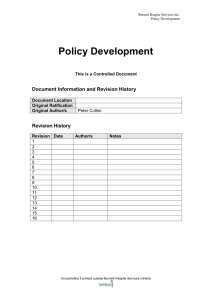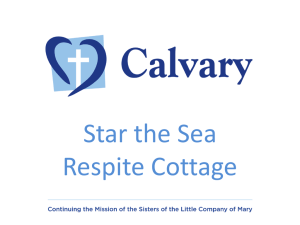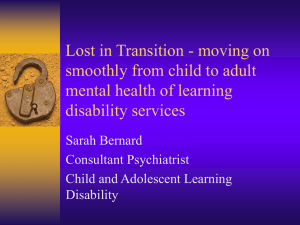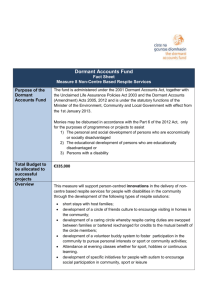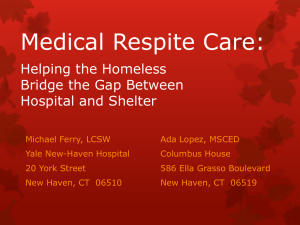1040 Children`s Respite Criteria & Instructions
advertisement
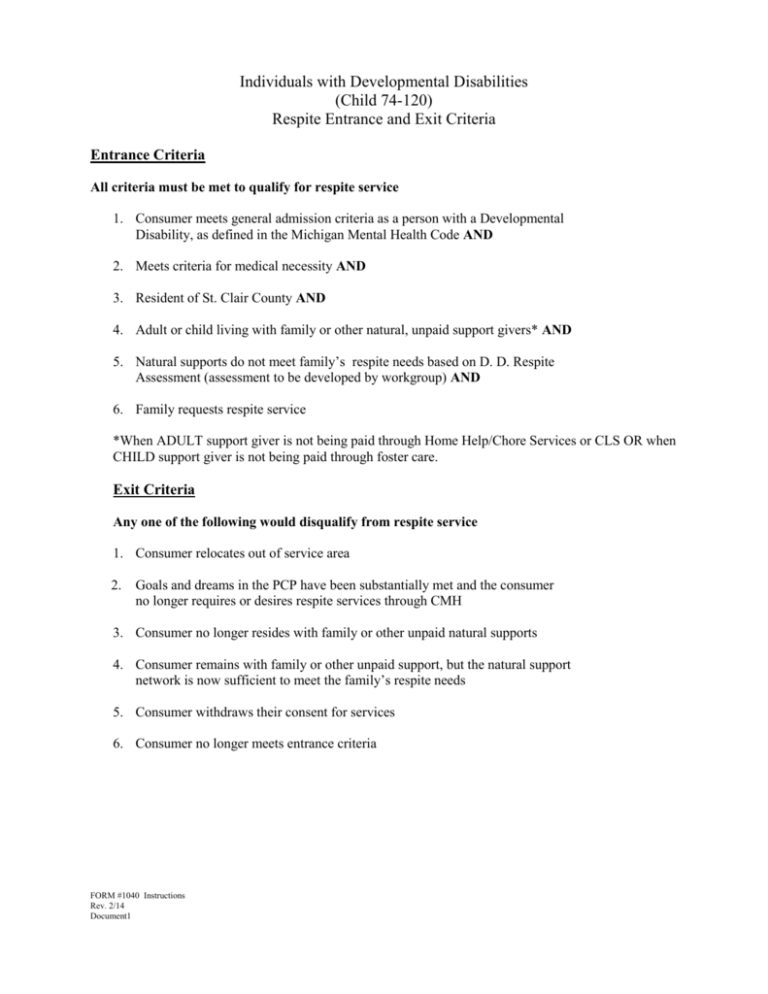
Individuals with Developmental Disabilities (Child 74-120) Respite Entrance and Exit Criteria Entrance Criteria All criteria must be met to qualify for respite service 1. Consumer meets general admission criteria as a person with a Developmental Disability, as defined in the Michigan Mental Health Code AND 2. Meets criteria for medical necessity AND 3. Resident of St. Clair County AND 4. Adult or child living with family or other natural, unpaid support givers* AND 5. Natural supports do not meet family’s respite needs based on D. D. Respite Assessment (assessment to be developed by workgroup) AND 6. Family requests respite service *When ADULT support giver is not being paid through Home Help/Chore Services or CLS OR when CHILD support giver is not being paid through foster care. Exit Criteria Any one of the following would disqualify from respite service 1. Consumer relocates out of service area 2. Goals and dreams in the PCP have been substantially met and the consumer no longer requires or desires respite services through CMH 3. Consumer no longer resides with family or other unpaid natural supports 4. Consumer remains with family or other unpaid support, but the natural support network is now sufficient to meet the family’s respite needs 5. Consumer withdraws their consent for services 6. Consumer no longer meets entrance criteria FORM #1040 Instructions Rev. 2/14 Document1 Children with SED Respite Entrance and Exit Criteria Respite care services must only be provided on an intermittent or short-term basis due to the absence or need for relief of the parent. “Short-term” means respite service is provided during a limited period of time, for example, a few hours, few days, weekends, or vacation. Respite is not intended to be provided on a continuous, long-term basis where it is a part of daily services that would enable an unpaid caregiver to work. In keeping with the Medicaid guidelines, Respite funds will be used to stabilize the high need child/adolescent enabling them to remain in the home and community. Admission Criteria: all criteria must be met ● The child/adolescent is a resident of St. Clair County and living with a parent/legal guardian. (Foster Care parents are not eligible) ● The child/adolescent has been diagnosis with a serious emotional disturbance. ● The child/adolescent is under the age of 18 years. ● The child/adolescent meets criteria for medical necessity; in that, respite is required to assist/ maintain a goal of living in a natural community home by temporarily relieving the unpaid primary caregiver. ● The child/adolescent has an open case with (CMH agency) and respite has been identified as a need through the Family Centered Planning process. ● Family of a child/adolescent has insufficient natural supports to meet the family’s respite needs. ● The child cannot be receiving respite services from another program. Authorization Guideline CAFAS Score 50-90 100-120 130-150 Above 150 CAFAS Caregiver Score Since respite is a temporary relief for the primary caregiver, the score is considered in the medical necessity determination Hours of Respite per week Up to 2 hours Up to 4 hours Up to 6 hours ■ For CAFAS score over 150, services must be part of a plan that includes intensive community-based mental health services ■ The amount of respite considered for authorization will be based on the recommendation made by the family centered planning team to the program administrator. Continuing Stay Criteria ● Respite is meant to be a temporary support; therefore it should be authorized for a 3 month period of time. Medical necessity must be fully established for each new authorization. ● Current symptoms and or functional impairments continue to meet admission criteria. ● Community options/natural supports which would meet the family’s respite needs are not available. Discharge Criteria ● The family’s need for respite has been substantially met. ● The family is able to transition to community options/natural supports which would meet their respite needs. ● The child/adolescent no longer meets the admission criteria. ● The family withdraws consent for respite services. ● The family is non-compliant with the Family Centered plan of service. Individuals with Developmental Disabilities FORM #1040 Instructions Rev. 2/14 Document1 (Child 74-120) Respite Assessment Training/Completion Instructions Preface: The intent of the DD Respite Assessment is to standardize the assessment and authorization of respite services across the St. Clair County CMH service area. As this assessment has been developed and approved by the agency, it is the expectation that all clinicians and supports coordinators will implement it in the standardized manner expressed in the instructions. Reminder: The definition of respite per the Michigan Medicaid Provider manual is “to provide an occasional and intermittent break to the caregiver.” The tool is designed to look at potential contributors related to the consumer’s support needs which may or may not take away from the caregiver’s ability to function day to day, have adequate sleep time, have positive relationships and get things done. Stress is not the rationale behind respite. Stress is subjective and occurs without the responsibilities of parenting or caring for a disabled individual. Some people deal with stress better than others. Who completes and when assessment is completed: The assessment should be implemented when a new consumer comes into services and annually (MINIMUMLY) prior to the Person Centered Plan by the Support Coordinator/Designee based on their knowledge of the consumer and family circumstances. It should be completed more frequently as changes in family support system, natural supports, and/or additional services occur for the consumer/family. If a family experiences a change in circumstance where upon reassessing may qualify for additional hours, the Support Coordinator/Designee should authorize those additional hours in a specified short-term number of weeks to assist them through that circumstance. This is, of course, after other potential services have been assessed for to possibly provide support for the consumer/family. Ensure that you are differentiating between a family’s choice and true need. Assessment Format: The assessment is divided into five areas which identify the level of support needed by the consumer, level of support currently being provided to the consumer, medical and/or behavioral intensity of the consumer and level of functioning by the consumer or support provided by the caregiver for personal care and daily living skills. These are not meant to assess for specific levels of Community Living Skills, Home Help/Chore Services, or parental stress but, may assist you in determining other resources that may need to be addressed or pursued. Rating Scale and Authorization: Upon completion of the assessment, the scores for each section will be transferred to the rating scale where the number of hours to be authorized will be determined. FORM #1040 Instructions Rev. 2/14 Document1
